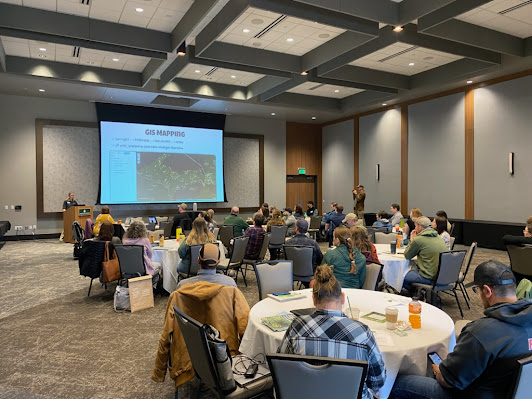2024 Upper Peninsula Invasive Species Conference Recap
Image of conference room full of attendees
Last week UPRCD hosted the Upper Peninsula Invasive Species Conference. After a nearly 8 year hiatus, the UP Phragmites Coalition brought this event back. This two day event, April 16-17, 2024 in Marquette, MI, will utilize the partnerships of all 5 UP CISMAs to network, share success stories, highlight management/monitoring/
The first day focused on invasive phragmites management, treatment, hardships and successes. We had presentations about the overview of the phragmites project, what the CISMAs and UPRCD have been doing, testing for hybrid phragmites, Phragmites work across the Great Lakes Region and we had the Great Lakes Commission speak on PAMF and the Phragmites Collaborative. Attendees had the option to register to set up a table and a lot of these were utilized during breaks and were a great location to go network and ask questions to colleagues. Wild Rivers Invasive Species Coalition had a phenomenal table display with a board game created for invasive species awareness and many tables had thoughtfully designed stickers that guests could collect.
Display tables from various collaborators
Lake to Lake gave away native seed packets
Breakout room for terrestrial invasives full of attendees
The second day focused on other species and ended on restoration topics. Breakout sessions were separated based on being aquatic or terrestrial. A crowd favorite was an update on Hemlock Wooly Adelgid gaining a lot of audience questions and also a talk on how to rate management success which was a joint presentation between Invasive Species Centre and Three Shores CISMA. However, every presentation was relevant to our line of work and brought beneficial conversation and ideas to the table. Another very popular part to the conference was the native plant restoration panel. The panel of 4 native plant experts were asked a hand full of questions to fill a 50 minute time slot and their answers were carefully thought out and exhibited a passion for the future care of native plants and climate and human impact issues.
Interviewing the native plant restoration panel








.png)
Comments
Post a Comment